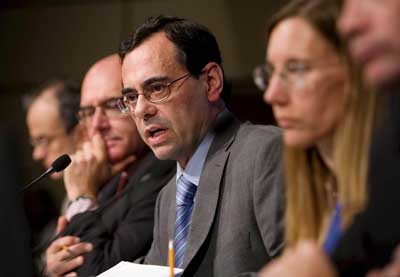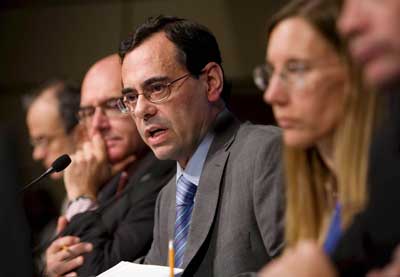
 Jaime Caruana was appointed general manager of the Bank for International Settlements in 2009. (Photo: Handout via EPA/IMF)The Financial Times published an interesting article on May 16 about problems with Ireland’s gross national product (not gross domestic product) accounting. Essentially, measured income is being inflated by foreign companies with no real activity in Ireland that, nonetheless, find ways to make profits materialize in a low-tax jurisdiction.
Jaime Caruana was appointed general manager of the Bank for International Settlements in 2009. (Photo: Handout via EPA/IMF)The Financial Times published an interesting article on May 16 about problems with Ireland’s gross national product (not gross domestic product) accounting. Essentially, measured income is being inflated by foreign companies with no real activity in Ireland that, nonetheless, find ways to make profits materialize in a low-tax jurisdiction.
We sort of knew this was happening — that, for example, a lot of the apparent rise in productivity was just a shift to pharmaceutical companies that add little to the Irish economy. But a new report from the Economic and Social Research Institute suggests that the problem is bigger than realized.
This passage in the Financial Times article got me: “The E.S.R.I. research raises question marks over the strength of Ireland’s recovery, which has surprised many foreign observers in light of the severe economic crisis the country experienced in 2008.” Who are these surprised foreign observers? My impression is that Ireland has been proclaimed a success story again and again and again, only to have the narrative slink away in the face of disappointing experience.
And if we look at the jobs numbers, which are not subject to these accounting issues, we can see what the “strength of Ireland’s recovery” looks like — check out the chart.
 The Sadomonetarists of Basel Earlier this month, The Wall Street Journal highlighted a speech by Jaime Caruana, general manager of the Bank for International Settlements, warning about the dangers of easy money and the need to raise rates now to avert … something or other. And his views matter, according to the Journal: “Mr. Caruana is no disgruntled outvoted hawk on a policy-setting council, trying desperately to set the record straight after being outvoted,” Geoffrey T. Smith wrote online. “Rather, he’s the mouthpiece for a global college of central bankers, almost all of whom find themselves under intense pressure from their national governments to keep things ticking over while they try to repair the economy. His views also matter for another reason: The B.I.S. is one of the few international financial institutions (some say the only one) to see the financial crisis coming and to issue clear warnings ahead of time.”
The Sadomonetarists of Basel Earlier this month, The Wall Street Journal highlighted a speech by Jaime Caruana, general manager of the Bank for International Settlements, warning about the dangers of easy money and the need to raise rates now to avert … something or other. And his views matter, according to the Journal: “Mr. Caruana is no disgruntled outvoted hawk on a policy-setting council, trying desperately to set the record straight after being outvoted,” Geoffrey T. Smith wrote online. “Rather, he’s the mouthpiece for a global college of central bankers, almost all of whom find themselves under intense pressure from their national governments to keep things ticking over while they try to repair the economy. His views also matter for another reason: The B.I.S. is one of the few international financial institutions (some say the only one) to see the financial crisis coming and to issue clear warnings ahead of time.”
I guess we can check the record here and see just how prescient the B.I.S. was. What I do recall, however — which the Journal apparently doesn’t — is that the B.I.S. has spent years warning about the dangers of low interest rates. Except that a couple of years back it was telling a completely different story about why we needed to raise rates; you see, the big danger was imminent inflation.
According to a Bloomberg article from June 27, 2011: “ ’Global inflation pressures are rising rapidly as commodity prices soar and as the global recovery runs into capacity constraints,’ said the B.I.S., which acts as a central bank for the world’s central banks. ‘These increased upside risks to inflation call for higher policy rates.’ ”
In fact, inflation is running below target just about everywhere. You might therefore think that the B.I.S. would step back a bit and reconsider both its policy recommendations and the framework it uses to derive those recommendations. But no. Higher interest rates are always the solution; it’s only the problem they’re supposed to solve that changes.
Join us in defending the truth before it’s too late
The future of independent journalism is uncertain, and the consequences of losing it are too grave to ignore. To ensure Truthout remains safe, strong, and free, we need to raise $24,000 by the end of today. Every dollar raised goes directly toward the costs of producing news you can trust.
Please give what you can — because by supporting us with a tax-deductible donation, you’re not just preserving a source of news, you’re helping to safeguard what’s left of our democracy.